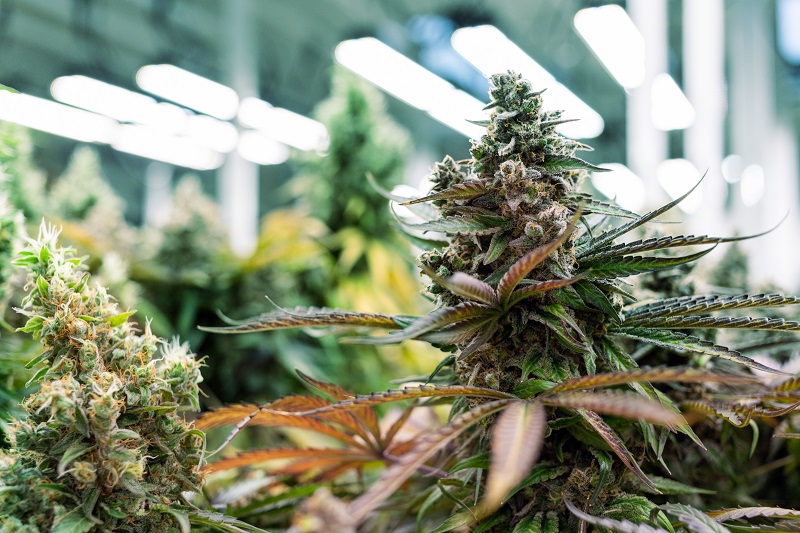By Joshua Burd
With licensing for recreational marijuana now underway in New Jersey, commercial real estate owners are seeing a real-time rush for spaces that will help launch the industry beyond the medicinal use market created more than a decade ago.
Insiders point to one glaring challenge in the early going — industrial space has never been harder to find in the Garden State, creating an added hurdle for the manufacturing and cultivation businesses that regulators conditionally approved in late March. It only complicates a market that, for now, is limited to less than a third of New Jersey municipalities.

“The demand is huge,” said Jack Fersko, a Roseland-based attorney with Greenbaum Rowe Smith & Davis LLP, who chairs the firm’s real estate department and cannabis industry practice, noting that conditional licensees have 120 days to secure a location.
“They really need to get space locked up and the landlords know it,” he added. “And there’s not a lot of negotiation taking place.”
To that end, Fersko in late March was representing at least four different property owners that were weighing leases with cannabis tenants. When a deal fell through at one of the buildings, there were “eight people in line who keep calling, wanting the property.”
Fersko also represents the owner of an older office building that could now become a cultivation site, whose operator didn’t necessarily need high ceilings and saw the chance to convert the space. The landlord is now selling the building at “a good premium for a market class that was a little challenged,” in another sign of the demand from the cannabis industry.
With medical marijuana sales legal since 2010, New Jersey’s recreational use market is slated to reach $2 billion in five years, by some projections. State regulators have worked to establish an industry framework since Gov. Phil Murphy, largely with social justice reform in mind, signed a law in February 2021 to legalize adult use sales and advance a policy that voters also supported in a November 2020 ballot question.
On March 24, the New Jersey Cannabis Regulatory Commission approved 68 conditional licenses for cannabis cultivation and manufacturing businesses, the first to be cleared under the recreational program. The agency drew criticism for delaying the start of retail sales — including from established medical operators that are eager to expand — but the approvals set the stage for a level of real estate activity that had been only contemplated in recent years.

“They are essentially the beginning of the supply chain,” said Edmund DeVeaux, president of the New Jersey CannaBusiness Association, referring to cultivating and manufacturing sites. He believes that “it’s going to take the longest to get them up and running,” he said, due in part to their heavy-duty power, ventilation and plumbing requirements.
“So it’s not a bad thing to get them out, get them on the road first and make sure that they’re investing and creating their grow facilities and processing facilities.”
The approvals, meantime, have spawned a new crop of users seeking industrial space in New Jersey, in a market that has seen record lows in vacancy and double-digit asking rents, on average. They also laid bare the challenges that operators and legal experts have long discussed with respect to leasing space to a cannabis business. Chief among them is the fact that marijuana is still illegal under federal law — despite recent momentum in Congress to decriminalize it — meaning lenders may balk at financing such properties.

“Landlords absolutely are and should be concerned about getting lender approval prior to getting too far into any negotiations with potential cannabis tenants,” said Matthew Schiller, a partner and commercial leasing practice group leader with Murphy Schiller & Wilkes LLP, in Newark. That goes for both industrial and retail sites, where such a tenant may violate “compliance with law” covenants and other leasing approval contingencies in the loan documents.
Property owners are now having those conversations with lenders, Schiller said, but cannabis operators are more likely to find space through acquisition or by renting from “a landlord that owns property without institutional financing in place.”
Some landlords have determined that “there’s not enough of a premium” to get involved with cannabis tenants, Fersko said, especially given industrial rents are already sky-high.
“On the one hand, it may be an easier deal to sign up because there is going to be less negotiation,” he said. “On the other hand, it’s certainly a more risky deal on the front side of it until licenses are issued, the tenant is up and running and you know that you have an operational business to meet the rent stream requirement.”
As experts also note, discussions of vacancy rates, loan agreements and other real estate matters are all but irrelevant in more than two-thirds of New Jersey’s 565 municipalities. State law required towns and cities last year to declare by ordinance whether they’d participate in the cannabis industry. Around 160 have opted in at some level, with some choosing to allow only certain segments such as cultivation, warehousing or retail.
That makes it all the more difficult for cannabis operators to find space, especially the growers and processers that were emphasized in the state’s first round of adult use approvals.

“This is part of the storm and part of the difficulty on cultivation and manufacturing licenses,” said Michael McQueeny, a New York-based attorney with Foley Hoag LLP. “I think we’ll see that play out in the next six to nine months in particular.”
McQueeny, a counsel in the firm’s national cannabis practice, was among the panelists in a recent webinar hosted by the Urban Land Institute’s Northern New Jersey chapter. He lamented the reality that “we’re going to have a lot of orphan licenses, in the sense that I think a lot of them will get that initial conditional approval and then … end up falling off a cliff after that 120 days.”
Other panelists suggested that one of New Jersey’s biggest assets — its access to the prized consumer bases of New York City, Philadelphia and its own state — could challenge the growth of the cannabis industry in a way that has not impacted the other 17 states with legal adult use. As such, fulfilling that demand could hinge on new construction and towns that take an especially proactive approach.

“Those who are interested in opting in at some point should start looking at areas in their municipality that perhaps they do want to zone exclusively for cannabis use, because it will mitigate a host of other factors,” said Michèle S. Delisfort, principal and managing partner of the Nishuane Group, a planning firm, and a Union Township committee member. “You won’t have the nuisance or the NIMBY issues, so if municipalities are a little bit more proactive about if, when and where they want to put the zones, that would probably mitigate some of these issues.”










